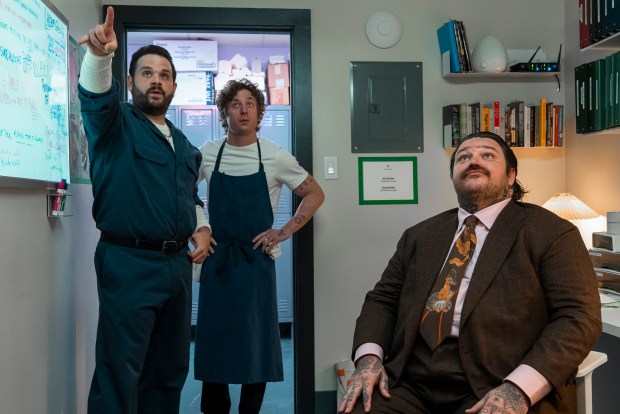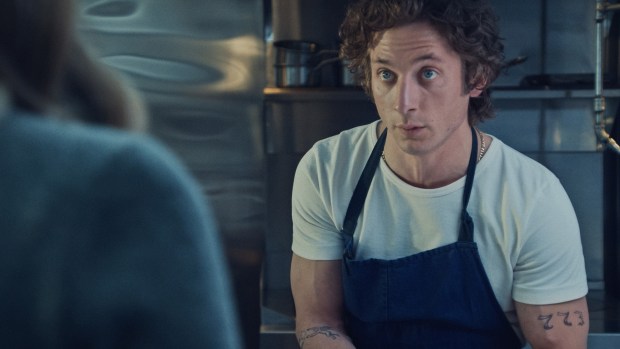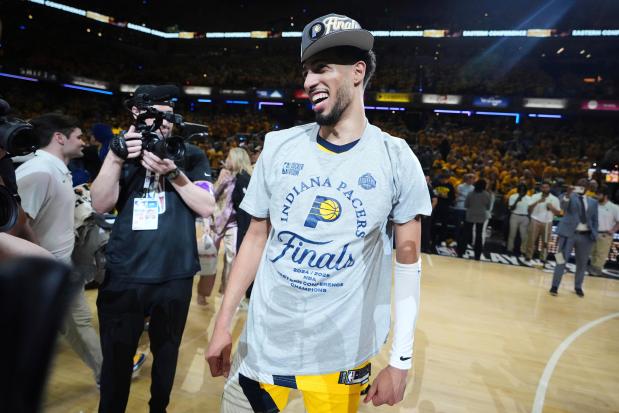When it comes to “The Bear,” there will be blood. Heart and warmth, too. But also yelling. Lots and lots of yelling.
The sweaty, frenetic story of a humble Chicago sandwich shop slinging Italian beef before pivoting to fine dining, Season 3 of the FX series (streaming on Hulu) has reached the sink-or-swim portion of the narrative, of a restaurant start-up led by a chef whose ambitions may outweigh his reality.
The show’s slice-of-life anxieties were stress-inducing when it premiered two years ago and that continues apace. What’s changed is “The Bear’s” laser focus of its earlier seasons. I like that showrunners Christopher Storer and Joanna Calo don’t feel compelled to rush things along — this is the plodding work of a restaurant still figuring itself out in the early going — but the episodes sometimes feel like they’re spinning their wheels, or biding time until something meaningful takes shape.
Carmen “Carmy” Berzatto (Jeremy Allen White) is at the center of it all. That’s always been the case. But more so than ever, this has become the Carmy show. After his meltdown on opening night at the end of Season 2, the new season picks up in the aftermath with a 35-minute montage of meditative scenes sliding back and forth in time featuring the moments — and the people — that made the man. It’s a risk to start the season this way. The episode demands a patience it doesn’t always earn. We know who Carmy is by now, a sad-eyed husk of a person chasing professional validation to escape the shadow of a dysfunctional upbringing. An episode-length recap of that doesn’t deepen our understanding of how we got here, or what it means for everyone else who has staked their faith in his talents.
Once the story begins in earnest in Episode 2 and his coworkers file in bright and early, Carmy’s nickname — Bear — becomes all too literal as he tears in and projects all his shame and inadequacy onto them.
His desire for excellence means he’s recreating an environment of clenched fear and consternation that he hated so much in the worst of his previous jobs. Whatever small measure of perspective he gained returning home to the family restaurant and starting over is gone. He has emotionally regressed and his tantrums are taking a toll. It’s remarkable no one has knocked his block off yet.
Carmy is determined to earn a Michelin star for the place, even if he alienates everyone around him in the process. Cousin Richie (Ebon Moss-Bachrach), who upped his game running front of the house, has more practical concerns. He just wants to do a good job and cares about the customer experience. He isn’t hung up on the “gastronomical proclivities of some dusty French tire marketing executive.” And anyway, “I’m a Pirelli guy.”
Despite a more collaborative relationship that once existed between Carmy and chef de cuisine Sydney (Ayo Edebiri), Carmy now has a tunnel vision that pushes her own creativity to the sidelines. There’s an offer on the table to make her a partner. But gone are the days of mentoring or quiet moments out back taking a breather. Some audiences have been hopeful their relationship would progress to something more. Restaurants are notorious for their sometimes ill-advised hookups among the staff. But Carmy can be disrespectful and dismissive toward Sydney — he’s not singling her out; that’s how he treats everyone — and the show is making it clear that if you care about Sydney, you wouldn’t want this for her in a romantic context. Anyway, there’s something compelling about friends and colleagues connecting with an intimacy and intensity that jumps off the screen but remains platonic.
That said, Sydney’s story feels underserved this season, even if Edebiri conveys so much through her character’s thoughtful, sometimes uncomfortable silences. She’s conflict-averse but she’ll have to have a meaningful talk with Carmy eventually. In the meantime, he is the taskmaster and she, along with everyone else, exists to execute his vision. Pastry chef Marcus (Lionel Boyce) has also been pushed to the margins in favor of more Carmy. Other members of the kitchen are given brief attention: Sweeps (Corey Hendrix) is put on a sommelier path and Ebraheim (Edwin Lee Gibson) is tasked with servicing the Italian beef take-out window. But it’s a missed opportunity that the show doesn’t carve out more time to deepen their personalities and their point of view when it comes to all the changes in their workplace.
At best, Carmy communicates through a hangdog resignation or gritted teeth. At worst, he blows his top. The stakes are high: If the restaurant isn’t a moneymaker fast, Uncle Jimmy (Oliver Platt) — who poured nearly a million dollars into the place — will pull the plug. Their fate hangs in the balance pending a review in the Chicago Tribune.
None of this plays out as comedy, even if that’s how the network has categorized the show for awards purposes. There is less humor this season than ever. Most of the comic relief is courtesy of Frick-and-Frack handyman brothers Neil and Ted Fak (played by Matty Matheson and Ricky Staffieri) and a little of their schtick goes a long way. The show struggles with that balance.

If Season 3 doesn’t reach the heights of earlier seasons, the best of it still works remarkably well, especially when it slows down and takes a breath. There’s an episode devoted to Richie’s awkward but somehow graceful acceptance of his post-divorce personal life. It’s unclear if he’s getting professional help but I’d wager yes, judging by the therapyspeak that sometimes peppers his speech: “Chef Carmen uses power phrases because he’s a baby replicant who’s not self-actualized.” Another terrific episode (which Edebiri directs) is the story of how Tina (Liza Colón-Zayas) came to work at the Original Beef of Chicagoland and it’s a wonderful contrast to the present. When she first walks in, there is life in the place; it is conspicuous what has been lost in the years since. There’s nothing wrong with Carmy pushing the business in a different direction, but this flashback underscores the grief everyone now carries with them, and how deeply Carmy has done a number on them in the months since. These episodes allow you to live with the characters in their quieter moments, away from the mishegoss Carmy is perpetrating in the kitchen.
There is a brief mention of grumbling among old-timers that the neighborhood staple has forsaken its roots. I wish the show had more interest in exploring that. And there remains an unanswered question I first brought up last season: As a pair, Carmy and Sydney found real fulfillment and dignity in making affordable food better at the grimy little sandwich spot. So what’s behind this drive to achieve something notable in the fine dining space? I think for Sydney, it’s a way back in after she was burned by her earlier ambitions.
For Carmy, the answers are less clear. He left home only to lose himself in the punishing world of elite kitchens. He found a small piece of himself again amid the beef juice splattered confines of the family business. Now he’s discarded that once again in favor of a dream that may not even be satisfying if he attains it. He said as much in Season 1 when describing how it felt to win his first Michelin stars. Maybe some of this is rooted in getting the right kind of accolades needed to make the restaurant viable. But not all.
It’s a battle for Carmy’s soul as he tries to outrun his feelings. What does he want really? Where does Sydney — or anyone else — fit in with that? As the season finale promises, “to be continued.”
“The Bear” Season 3 — 3 stars (out of 4)
Where to watch: Hulu
Nina Metz is a Tribune critic





